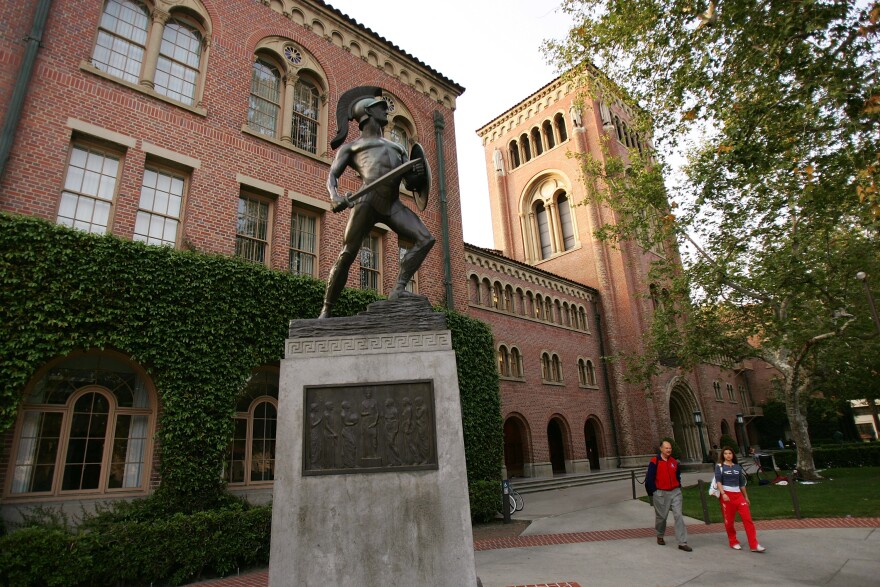This story is free to read because readers choose to support LAist. If you find value in independent local reporting, make a donation to power our newsroom today.
This archival content was originally written for and published on KPCC.org. Keep in mind that links and images may no longer work — and references may be outdated.
USC's non-tenure-track professors take first step to unionizing

About 500 lecturers, visiting professors and part-time faculty, all who are not on a tenure-track at the University of Southern California are filing a petition to unionize today, saying they want better job security and more livable wages.
They say that faculty who are not on the tenure track earn about $5,000 per class on average, and that it's not enough to live on in Southern California.
“I love what do here, I love my job. I wouldn’t trade the work that I do for any other," said Kate Levin, who has taught writing at USC since 2011. "But — I personally — I find it hard to afford my rent. I find it hard to afford day care for my kid, and sort of the basic necessities of life, on what we make here.”
Levin teaches two writing classes a semester — more than some part-time faculty. She said she also earns a bit more per class than others, $8,000 a class. But that amounts to about $32,000 a year. To supplement, she does freelance writing.
Levin said she has benefits, but some some part-time professors don't, like Alexis Disselkoen, who has taught in the art department at USC for almost four years.
"I would like to see things like some more job security, and potentially being able to work toward getting health benefits - one, day, hopefully," said Disselkoen.
She said she used to teach two classes, but now teaches only one, a class on Los Angeles culture. She works various other jobs to make ends meet.
Non-tenured faculty at USC began organizing in January with the Service Employees International Union. According to the SEIU, close to 70 percent of the university's faculty is not on the tenure track.
SEUI officials say this is part of a growing trend in university hiring, as part-time professors now outnumber full-time tenure track professors on U.S. university campuses. Statistics from USC's Rossier School of Education back this up. Rossier's Delphi Project tracks changes in faculty hiring nationwide, and found that in 1969, 78 percent of faculty at U.S. universities were employed as full-time tenure-track professors. By 2009, that number had fallen to 33.5 percent. The remaining 66.5 percent were made up of full-time non-tenured faculty (18.8 percent) and part-time instructors (47.7 percent).
From a union statement:
Despite skyrocketing tuition costs (USC tuition has increased 92 percent since 2001), colleges and universities are driving down the cost of instruction by hiring faculty into low-paid, temporary positions with no job security and little or no benefits.
USC officials have not backed the effort. Earlier this year, Provost Michael Quick wrote on USC’s website that the part-time faculty's unionizing effort would lead to, quote, “an adversarial model” of labor relations.
Quick addressed the union effort in another letter to faculty earlier this month:
"If the SEIU has its way, your right to represent yourself concerning pay, benefits and working conditions would be transferred to the SEIU, and you would have to pay dues to the SEIU as a condition of employment."
Correction: An earlier version of this post mischaracterized the professors who are part of this unionizing effort as "part-time" rather than non-tenure track; the group includes some full-time instructors. KPCC regrets the error.







